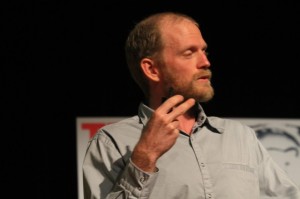Two very different personalities on the TEDX Berkeley stage this past weekend: Asma Abbas, who raised the notion of compassion, emphathy, suffering and heartbreak — how are they related to politics? She suggested a correlation between how deep we can go with empathy and the degree of homogeneity in the society.Enter personality number 2: inventor Ross Evans, who reached his audience through storytelling, and the idea that the combination of passion, purpose and contribution result in unlimited possibilities. Compassion and emphathy are blown open and now only are they contageous like Dacher Keltner suggests, but a must if we are to find sustainable happiness in our lives.
 Political theorist Asma Abbas attempts to draw out of the crowd, posing a number of questions: what do you think of heartbreak and what it means? How do you think heartbreak relates to politics? She also talks about how heartbreak relates to suffering and what suffering means and how it plays out in less homogeneous societies. She asks, “what is it that you and I would die for?”
Political theorist Asma Abbas attempts to draw out of the crowd, posing a number of questions: what do you think of heartbreak and what it means? How do you think heartbreak relates to politics? She also talks about how heartbreak relates to suffering and what suffering means and how it plays out in less homogeneous societies. She asks, “what is it that you and I would die for?”
Clearly emotional about the subject, she had a hard time bringing many of us to her central point. Moving in a direction many of us who have either lived abroad or traveled extensively can resonate with, I resonate when she says, “the amount of emotion and the range I have for it when I return to the states, shrinks. She suggests as a response to what heartbreak has to do with politics – “doesn’t it have to do with who our heart breaks for? Who is it that our heart goes out to and why?”
She says, “this demand that someone can make on your emotion in a world where gratitude and emphathy are low, just doesn’t work. We are making a mistake if we assume that everyone is working towards the same end.” She continues, “there are many ways we confront suffering. As things become more homogeneous, it becomes harder to be empathetic and compassionate.” What would death mean if there wasn’t life? She asserts that some people can’t give up ‘living suffering’ because it’s a way to connect with the future.
 Ross Evans, inventor of Xtracycle and founder of Worldbike, takes us on a journey to Africa, where we see the workshops they set up to show locals how to use these bikes as a way to alleviate poverty and get people to medical care in times of need.
Ross Evans, inventor of Xtracycle and founder of Worldbike, takes us on a journey to Africa, where we see the workshops they set up to show locals how to use these bikes as a way to alleviate poverty and get people to medical care in times of need.
Ross also created HoliShift, to promote and evangelize the belief that passion + purpose + contribution, will give you everything that you need in your life to not only be happy, but to create miracles.
Examples of HoliShift questions could be: what is sacred to you? what powers your spirit?
We all know passion: it’s what we love. When we’re doing our ‘purpose,’ we feel as if times goes away. We’re completely in flow when we are living our ‘purpose.’ It’s how we provide value to our own lives as well as others around us. When we provide enough value, the world simply takes care of us.
It’s clear that most people want to make an impact in the world before the end of their lives. When we find that intersection between the three – passion, purpose and contribution, then we will create the most impact. We understand this intersection ‘naturally’ as children, but over time, it gets beaten out of us.

